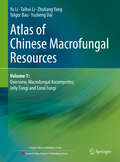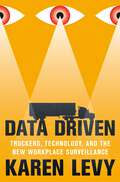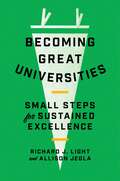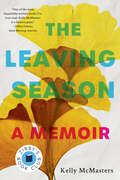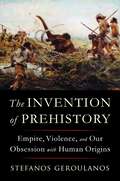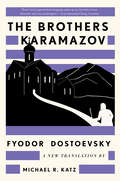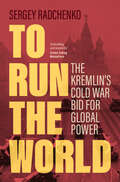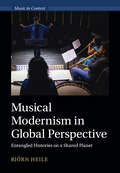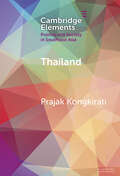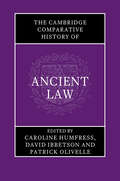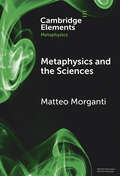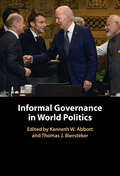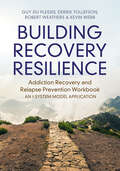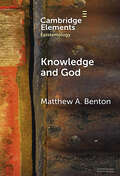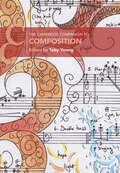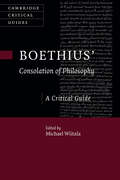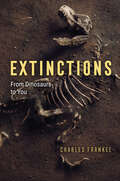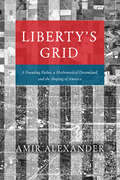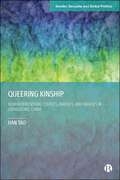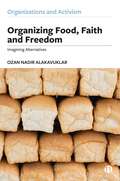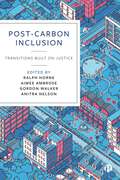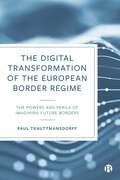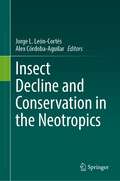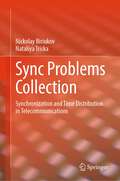- Table View
- List View
Atlas of Chinese Macrofungal Resources: Volume 1: Overview, Macrofungal Ascomycetes, Jelly Fungi and Coral Fungi
by Yu Li Taihui Li Zhuliang Yang Tolgor Bau Yucheng DaiThis book is part of the 4-volumes collection of Atlas of Chinese Macrofungal Resources . This atlas documented 1819 species (or varieties) in 509 genera of macrofungi known from China, which are, according to their morphological characteristics, practically divided into 10 groups, including 196 larger ascomycetes, 21 jelly fungi, 47 coral fungi, 637 polyporoid, hydnaceous and lephoroid fungi, 11 cantharelloid fungi, 653 agarics, 130 boletes, 75 gasteroid fungi, 16 larger pathogenic fungi on crops, and 33 larger myxomycetes.All species are evidenced with voucher sand photographs. About 370 of the listed species (occupying 1/5 of the totals pieces) have their type localities in China, among which over 260 species (accounting for 1/7 of the species) were firstly discovered and published by the present authors. Some of the species are endemic to China and East Asia. Introduction to all species are accompanied with color photographs showing their macro-morphology and (or) habitat. The macroscopic and microscopic diagnostic characters ecological habits, economic importance (edibility, medicinal availability or toxicity) and geographical distribution in China of all species are described in brief and easy-to-understand style. In the guide, the characteristics and using method of the book, related mycological vocabulary, common taxonomic techniques and positions of the fungal genera in modern taxonomic system are briefly introduced.The knowledge of this book should be interesting to mycologists, mycology fans and mushroom lovers, as well as researchers, teachers and students studying on edible fungi, plant pathology, healthcare and biomedicine sciences, bioresources and biodiversity, ecology and other related disciplines. It is an ideal reference for those who are interested in the Chinese macrofungi and larger slime molds. In this first volume, it covers Macrofungal Ascomycetes, Jelly Fungi and Coral Fungi.
Action
by J. KrishnamurtiThe passages in this volume are taken from works by Krishnamurti. These include public talks, questions and answers, conversations, and writings. Krishnamurti always spoke from such a large perspective that his whole vision was implied in any extended passage, or sometimes by even a very short quote. Krishnamurti offers radically different answers to questions about relationships with others, and why we do not act with clarity and intelligence. He says, surely true action comes from clarity. When the mind is very clear, unconfused, not contradictory within itself, then action inevitably follows from that clarity.
Data Driven: Truckers, Technology, and the New Workplace Surveillance
by Karen LevyA behind-the-scenes look at how digital surveillance is affecting the trucking way of lifeLong-haul truckers are the backbone of the American economy, transporting goods under grueling conditions and immense economic pressure. Truckers have long valued the day-to-day independence of their work, sharing a strong occupational identity rooted in a tradition of autonomy. Yet these workers increasingly find themselves under many watchful eyes. Data Driven examines how digital surveillance is upending life and work on the open road, and raises crucial questions about the role of data collection in broader systems of social control.Karen Levy takes readers inside a world few ever see, painting a bracing portrait of one of the last great American frontiers. Federal regulations now require truckers to buy and install digital monitors that capture data about their locations and behaviors. Intended to address the pervasive problem of trucker fatigue by regulating the number of hours driven each day, these devices support additional surveillance by trucking firms and other companies. Traveling from industry trade shows to law offices and truck-stop bars, Levy reveals how these invasive technologies are reconfiguring industry relationships and providing new tools for managerial and legal control—and how truckers are challenging and resisting them.Data Driven contributes to an emerging conversation about how technology affects our work, institutions, and personal lives, and helps to guide our thinking about how to protect public interests and safeguard human dignity in the digital age.
Becoming Great Universities: Small Steps for Sustained Excellence
by Richard J. Light Allison JeglaHow campus communities of every kind can transform themselves from good to greatBecoming Great Universities highlights ten core challenges that all colleges and universities face and offers practical steps that everyone on campus—from presidents to first-year undergraduates—can take to enhance student life and learning.This incisive book, written in a friendly and engaging style, draws on conversations with presidents, deans, and staff at hundreds of campuses across the country as well as scores of in-depth interviews with students and faculty. Providing suggestions that all members of a campus community can implement, Richard Light and Allison Jegla cover topics such as how to build a culture of innovation on campus, how to improve learning outcomes through experimentation, how to help students from under-resourced high schools succeed in college, and how to attract students from rural areas who may not be considering colleges far from their communities. They offer concrete ways to facilitate constructive interactions among students from different backgrounds, create opportunities for lifelong learning and engagement, and inspire students to think globally. And most of the ideas presented in this book can be implemented at little to no cost.Featuring a wealth of evidence-based examples, Becoming Great Universities offers actionable suggestions for everyone to have a positive impact on college life regardless of whether their campus is urban or rural, private or public, large or small, wealthy or not.
The Leaving Season: A Memoir In Essays
by Kelly McMasters“One of the most beautifully written books I've ever read. Kelly McMasters is a literary giant.”—Zibby Owens, Good Morning America A memoir in intimate essays navigating marriage and motherhood, art and ambition, grief and nostalgia, and the elusive concept of home. Kelly McMasters found herself in her midthirties living her fantasy: she’d moved with her husband, a painter, from New York City to rural Pennsylvania, where their children roamed idyllic acres in rainboots and diapers. The pastoral landscape and the bookshop they opened were restorative at first, for her and her marriage. But soon, she was quietly plotting her escape. In The Leaving Season, McMasters chronicles the heady rush of falling in love and carving out a life in the city, the slow dissolution of her relationship in an isolated farmhouse, and the complexities of making a new home for herself and her children as a single parent. She delves into the tricky and often devastating balance between seeing and being seen; loss and longing; desire and doubt; and the paradox of leaving what you love in order to survive. Whether considering masculinity in the countryside through the life of a freemartin calf, the vulnerability of new motherhood in the wake of a car crash, or the power of community pulsing through an independent bookshop, The Leaving Season finds in every ending a new beginning.
The Invention of Prehistory: Empire, Violence, And Our Obsession With Human Origins
by Stefanos Geroulanos“[A]n incisive and captivating reassessment of prehistory . . . In lucid prose, Geroulanos unspools an enthralling and detailed history of the development of modern natural science. It’s a must-read.” —Publishers Weekly, starred review “An astute, powerfully rendered history of humanity.” —Kirkus Reviews, starred review An eminent historian tells the story of how we came to obsess over the origins of humanity—and how, for three centuries, ideas of prehistory have been used to justify devastating violence against others. Books about the origins of humanity dominate bestseller lists, while national newspapers present breathless accounts of new archaeological findings and speculate about what those findings tell us about our earliest ancestors. We are obsessed with prehistory—and, in this respect, our current era is no different from any other in the last three hundred years. In this coruscating work, acclaimed historian Stefanos Geroulanos demonstrates how claims about the earliest humans not only shaped Western intellectual culture, but gave rise to our modern world. The very idea that there was a human past before recorded history only emerged with the Enlightenment, when European thinkers began to reject faith-based notions of humanity and history in favor of supposedly more empirical ideas about the world. From the “state of nature” and Romantic notions of virtuous German barbarians to theories about Neanderthals, killer apes, and a matriarchal paradise where women ruled, Geroulanos captures the sheer variety and strangeness of the ideas that animated many of the major thinkers of the eighteenth and nineteenth centuries, including Jean-Jacques Rousseau, Charles Darwin, and Karl Marx. Yet as Geroulanos shows, such ideas became, for the most part, the ideological foundations of repressive regimes and globe-spanning empires. Deeming other peoples “savages” allowed for guilt-free violence against them; notions of “killer apes” who were our evolutionary predecessors made war seem natural. The emergence of modern science only accelerated the West’s imperialism. The Nazi obsession with race was rooted in archaeological claims about prehistoric IndoGermans; the idea that colonialized peoples could be “bombed back to the Stone Age” was made possible by the technology of flight and the anthropological idea that civilization advanced in stages. As Geroulanos argues, accounts of prehistory tell us more about the moment when they are proposed than about the deep past—and if we hope to start improving our future, we would be better off setting aside the search for how it all started. A necessary, timely, indelible account of how the quest for understanding the origins of humanity became the handmaiden of war and empire, The Invention of Prehistory will forever change how we think about the deep past.
The Brothers Karamazov: A New Translation By Michael R. Katz
by Fyodor Dostoevsky"Lively, fast-flowing.... the voiciest translation of the novel thus far. [Katz] writes at the fever pitch of speech, unleashing the speed and the chaos of the original." —Jennifer Wilson, The New Yorker A monumental new translation—the first in more than twenty years—of Russia’s greatest family drama, rendered with all the passion, humor, and soul of the original. Dostoevsky’s final, greatest novel, The Brothers Karamazov, paints a complex and richly detailed portrait of a family tormented by its extraordinarily cruel patriarch, Fyodor Pavlovich, whose callous decisions slowly decimate the lives of his sons—the eponymous brothers Karamazov—and lead to his violent murder. In the aftermath of the killing, the brothers contend with dilemmas of honor, faith, and reason as the community closes in on the murderer in their midst. Acclaimed translator Michael R. Katz renders this masterpiece’s nuanced and evocative storytelling in a vibrant, signature prose style that captures all the power of Dostoevsky’s original—the clever humor, the rich emotion, the passion and the turmoil—and that will captivate and unsettle a new generation of readers.
To Run the World: The Kremlin's Cold War Bid for Global Power
by null Sergey RadchenkoWhat would it feel like To Run the World? The Soviet rulers spent the Cold War trying desperately to find out. In this panoramic new history of the conflict that defined the postwar era, Sergey Radchenko provides an unprecedented deep dive into the psychology of the Kremlin's decision-making. He reveals how the Soviet struggle with the United States and China reflected its irreconcilable ambitions as a self-proclaimed superpower and the leader of global revolution. This tension drove Soviet policies from Stalin's postwar scramble for territory to Khrushchev's reckless overseas adventurism and nuclear brinksmanship, Brezhnev's jockeying for influence in the third world, and Gorbachev's failed attempts to reinvent Moscow's claims to greatness. Perennial insecurities, delusions of grandeur, and desire for recognition propelled Moscow on a headlong quest for global power, with dire consequences and painful legacies that continue to shape our world.
Musical Modernism in Global Perspective: Entangled Histories on a Shared Planet (Music in Context)
by null Björn HeileIn the first study of the global dimensions of musical modernism, Björn Heile proposes a novel theory according to which musical modernism is constituted by a global diasporic network of composers, musicians and institutions. In a series of historical and analytical case studies from different parts of the world, this book overcomes the respective limitations of both Eurocentric and postcolonial, revisionist accounts, focusing instead on the transnational entanglements between the West and other world regions. Key topics include migration, the transnational reception and transfer of musical works and ideas, institutions such as the International Society for Contemporary Music (ISCM) and composers who are rarely discussed in Western academia, such as the Nigerian-born Akin Euba and the Korean-German Younghi Pagh-Paan. Influenced by the interdisciplinary notion of 'entangled histories', Heile critiques established dichotomies, all the while highlighting the unequal power relations on which the existing global order is founded.
Thailand: Contestation, Polarization, and Democratic Regression (Elements in Politics and Society in Southeast Asia)
by null Prajak KongkiratiThis Element aims to provide an overview of Thai politics with an up-to-date discussion of the characteristics of political regimes, political economy, and identity and mobilization that are grounded in historical analysis stretching back to the formation of the modern nation state. The thematic topics will focus on a) the chronic instability and ever-changing nature of political regimes resulting in the failure of democratic consolidation, b) the nexus of business and politics sustained by a patrimonial state structure, patronage politics and political corruption, and c) the contestation of identity and the causes and consequences of mass mobilization in the civic space and street politics.
The Cambridge Comparative History of Ancient Law
by Patrick Olivelle David Ibbetson Caroline HumfressThe Cambridge Comparative History of Ancient Law is the first of its kind in the field of comparative ancient legal history. Written collaboratively by a dedicated team of international experts, each chapter offers a new framing and understanding of key legal concepts, practices and historical contexts across five major legal traditions of the ancient world. Stretching chronologically across more than three and a half millennia, from the earliest, very fragmentary, proto-cuneiform tablets (3200–3000 BCE) to the Tang Code of 652 CE, the volume challenges earlier comparative histories of ancient law / societies, at the same time as opening up new areas for future scholarship across a wealth of surviving ancient Near Eastern, Indian, Chinese, Greek and Roman primary source evidence. Topics covered include 'law as text', legal science, inter-polity relations, law and the state, law and religion, legal procedure, personal status and the family, crime, property and contract.
Metaphysics and the Sciences (Elements in Metaphysics)
by null Matteo MorgantiThis Element presents and critically examines the relationship between metaphysics and the sciences. Section 1 provides a brief introduction. Section 2 looks at the methodological issues that arise when metaphysics and science get into contact, which is a much-debated aspect of the larger dispute concerning philosophical 'naturalism' and 'anti-naturalism'. A taxonomy of possible views is offered. Section 3 looks more specifically at milder forms of naturalism about metaphysics, which attempt in various ways to make it 'continuous' with science while preserving some degree of autonomy for it. Section 4 adds some reflections on what might be regarded as the most pressing open problem when it comes to doing scientifically oriented metaphysics (but also when practising metaphysics or science in isolation): the problem concerning theory choice and the value of non-empirical factors in determining which explanation of certain phenomena should be preferred.
Informal Governance in World Politics
by Kenneth W. Abbott Thomas J. BierstekerThroughout the nineteenth and twentieth centuries, cooperation among nations was based on international regimes and formal intergovernmental organizations. However, since the 1990s, informal modes of global governance, such as informal intergovernmental organizations and transnational public-private governance initiatives, have proliferated. Even within formal intergovernmental organizations, informal means of influence and informal procedures affect outcomes whilst, around all these institutions, even more informal networks shape agendas. This volume introduces and analyzes these three types of informality in governance: informality of, within, and around institutions. An introductory chapter traces the rise of informal governance and suggests a range of theoretical perspectives and variables that may explain this surge. Empirical chapters then apply these and other explanations to diverse issue areas and cross-cutting issues, often using newly developed datasets or original case study research. The concluding chapter sets out a research agenda on informality in global governance, including its normative implications.
Building Recovery Resilience: Addiction Recovery and Relapse Prevention Workbook – An I-System Model Application
by null Guy du Plessis null Derrik R. Tollefson null Robert Weathers null Kevin G. WebbThe first workbook written for individuals progressing through the Recovery Resilience Program, a person-centered, strength and resiliency-based relapse prevention and recovery-oriented intervention designed for individuals in addiction recovery. The book presents practices derived from the I-System Model and the evidence-based intervention Mind-Body Bridging that enhance 'recovery resilience' – a term we use to refer to an individual's capacity to effectively apply coping and self-regulation skills in dealing with cravings, triggers, stress, and high-risk situations without reverting to substance use. Each chapter introduces various Recovery Resilience Practices and explains how they can positively augment any recovery pathway. Readers can learn to use these practices through various exercises, which they can complete before moving on to the next chapter. The program helps individuals to draw upon and use their recovery capital (for example, skills, tools, knowledge, etc.), remove barriers along the way, and strengthen their internal resources, and ultimately reach recovery and life goals.
Knowledge and God (Elements in Epistemology)
by null Matthew A. BentonThis Element examines a main theme in religious epistemology, namely, the possibility of knowledge of God. Most often philosophers consider the rationality or justification of propositional belief about God, particularly beliefs about the existence and nature of God; and they will assess the conditions under which, if there is a God, such propositional beliefs would be knowledge, particularly in light of counter-evidence or the availability of religious disagreement. This Element surveys such familiar areas, then turns toward newer and less-developed terrain: interpersonal epistemology, namely what it is to know another person. It then explores the prospects for understanding what it might take to know God relationally, the contours of which are significant for many theistic traditions.
The Cambridge Companion to Composition (Cambridge Companions to Music)
by Toby YoungThere are as many ways of creating music as there are composers in the world, with a vast array of possible methods and practices. This book provides essential critical and practical tools for composers as they try to navigate this complex landscape, whilst also offering provocations for practitioners discovering their own voices and solidifying their place in their musical communities. Designed to be a companion in the truest sense, the book offers practical support throughout the creative process and thought-provoking insights on technical questions for a range of compositional approaches.
Boethius’ ‘Consolation of Philosophy’: A Critical Guide (Cambridge Critical Guides)
by Michael WiitalaBoethius' Consolation of Philosophy was one of the most widely read and influential texts in medieval Europe, considering questions such as How can evil exist in a world governed by God? And how is happiness still attainable despite the vicissitudes of fortune? Written as a dialogue between Boethius and Lady Philosophy, and alternating between poetry and prose, the Consolation is of interest not only to philosophers but to students of classics and literature as well. In this Critical Guide, the first collection of philosophical essays devoted exclusively to the Consolation, thirteen new essays demonstrate its ongoing vitality and break open its riches for a new generation of readers. The essays reflect the diverse array of approaches in contemporary scholarship and attend to both the literary features and the philosophical content of the Consolation. The volume will be invaluable for scholars of medieval philosophy, medieval literature, and the history of ideas.
Extinctions: From Dinosaurs to You
by Charles FrankelA compelling answer to an important question: Can past mass extinctions teach us how to avoid future planetary disaster? On its face, the story of mass extinction on Earth is one of unavoidable disaster. Asteroid smashes into planet; goodbye dinosaurs. Planetwide crises seem to be beyond our ability to affect or evade. Extinctions argues that geological history tells an instructive story, one that offers important signs for us to consider. When the asteroid struck, Charles Frankel explains, it set off a wave of cataclysms that wore away at the global ecosystem until it all fell apart. What if there had been a way to slow or even turn back these tides? Frankel believes that the answer to this question holds the key to human survival. Human history, from the massacre of Ice Age megafauna to today’s industrial climate change, has brought the planet through another series of cataclysmic events. But the history of mass extinction together with the latest climate research, Frankel maintains, shows us a way out. If we curb our destructive habits, particularly our drive to kill and consume other species, and work instead to conserve what biodiversity remains, the Earth might yet recover. Rather than await decisive disaster, Frankel argues that we must instead take action to reimagine what it means to be human. As he eloquently explains, geological history reminds us that life is not eternal; we can disappear, or we can become something new and continue our evolutionary adventure.
Liberty's Grid: A Founding Father, a Mathematical Dreamland, and the Shaping of America
by Amir AlexanderThe surprising history behind a ubiquitous facet of the United States: the gridded landscape. Seen from an airplane, much of the United States appears to be a gridded land of startling uniformity. Perpendicular streets and rectangular fields, all precisely measured and perfectly aligned, turn both urban and rural America into a checkerboard landscape that stretches from horizon to horizon. In evidence throughout the country, but especially the West, the pattern is a hallmark of American life. One might consider it an administrative convenience—an easy way to divide land and lay down streets—but it is not. The colossal grid carved into the North American continent, argues historian and writer Amir Alexander, is a plan redolent with philosophical and political meaning. In 1784 Thomas Jefferson presented Congress with an audacious scheme to reshape the territory of the young United States. All western lands, he proposed, would be inscribed with a single rectilinear grid, transforming the natural landscape into a mathematical one. Following Isaac Newton and John Locke, he viewed mathematical space as a blank slate on which anything is possible and where new Americans, acting freely, could find liberty. And if the real America, with its diverse landscapes and rich human history, did not match his vision, then it must be made to match it. From the halls of Congress to the open prairies, and from the fight against George III to the Trail of Tears, Liberty’s Grid tells the story of the battle between grid makers and their opponents. When Congress endorsed Jefferson’s plan, it set off a struggle over American space that has not subsided. Transcendentalists, urban reformers, and conservationists saw the grid not as a place of possibility but as an artificial imposition that crushed the human spirit. Today, the ideas Jefferson associated with the grid still echo through political rhetoric about the country’s founding, and competing visions for the nation are visible from Manhattan avenues and Kansan pastures to Yosemite’s cliffs and suburbia’s cul-de-sacs. An engrossing read, Liberty’s Grid offers a powerful look at the ideological conflict written on the landscape.
Queering Kinship: Non-heterosexual Couples, Parents, and Families in Guangdong, China (Gender, Sexuality and Global Politics)
by Han TaoBased on ethnographic fieldwork in Guangdong, China, this book asks: what does it mean for Chinese non-heterosexual people to go against existing state regulations and societal norms to form a desirable and legible queer family? Chapters explore the various tactics queer people employ to have children and to form queer or ‘rainbow’ families. The book unpacks people’s experiences of cultivating, or losing, kinship relations through their negotiation with biological relatives, cultural conventions and state legislations. Through its analysis, the book offers a new ethnographic perspective for queer studies and anthropology of kinship.
Organizing Food, Faith and Freedom: Imagining Alternatives (Organizations and Activism)
by Ozan Nadir AlakavuklarConsumerism, unsustainable growth, waste and inequalities continue to ail societies across the globe, but creative collectives have been tackling these issues at a grassroots level. Based on an autoethnographic study about a free food store in Aotearoa New Zealand, this book presents a first-hand account of how a community is organized around surplus food to deal with food poverty, while also helping the reader to see through the complexity that brings the free food store to life. Examining how alternative economies and relations emerge from these community solutions, the author shows it is possible to think, act and organize differently within and beyond capitalist dynamics.
Post-Carbon Inclusion: Transitions Built on Justice
by Ralph Horne, Aimee Ambrose, Gordon Walker and Anitra NelsonThis collection pays unique attention to the highly challenging problems of addressing inequality within decarbonisation – particularly under-explored aspects, such as high consumption, degrowth approaches and perverse outcomes. Contributors point out means and possibilities of the transition from high carbon inequalities to post-carbon inclusion. They apply a variety of conceptual and methodological approaches in all-inclusive ways to diverse challenges, such as urban heating and retrofitting. Richly illustrated with case studies from the city to the household, this book critically examines ‘just transitions’ to achieve sustainable societies in the future.
The Digital Transformation of the European Border Regime: The Powers and Perils of Imagining Future Borders
by Paul TrauttmansdorffThis book offers an in-depth investigation into the digitisation processes of Europe’s border regime. It shows how sociotechnical imaginations of future borders drive forward the expansion of databases in the European governance of mobility. With a focus on the European Union Agency eu-LISA, one of the most significant and rapidly advancing actors in the digital border regime, the book serves as a gateway to understanding the key agents, visions, technologies and practices at work. Asking broader questions about exclusion, discrimination, violence and mobility rights, this is an original contribution to our understanding of future borders in Europe.
Insect Decline and Conservation in the Neotropics
by Jorge L. León-Cortés Alex Córdoba-AguilarThis book provides for the first time an integrative analysis of the major drivers of decline and threats of insects and related arthropods in the Neotropical region. Thus, it is an urgent first step towards filling an information gap in this region. It identifies the main causes of decline, provides and discusses examples from the better-studied insect faunas to develop and advance principles and practical conservation management for the rich Neotropical insect faunas. The book is aimed at students, naturalists, environmental managers, and others who have training in entomology/insect ecology and can apply the results of surveys of key insect faunas to assess their vulnerability to environmental change and establish guidelines for their conservation.
Sync Problems Collection: Synchronization and Time Distribution in Telecommunications
by Nickolay Biriukov Nataliya TriskaThis textbook clarifies synchronization issues in telecommunications in an easy-to-follow way, focusing less on theory and more on practical aspects. The book is intended for a wide range of readers interested in the basic synchronization concepts in their wide application for development, maintenance, and conformity assessment of telecommunications equipment and networks. The authors show how, though synchronization in telecommunications has experienced rapid development, the foundational theory and the basic definitions, mathematical tools, and well-developed “classical” technologies have remained. The authors have studied the ITU-T, ETSI, IEEE standards, and extracted practical topics of synchronization. The collection of numerous training problems, practical examples, and case studies help the readers not only to find the answers to their current questions but also to get a common view of synchronization’s role in the modern telecommunications. The book is geared towards students of telecommunications but can also be useful for telecom engineers and for training/workshops for telecom engineers concerning synchronization topics.
